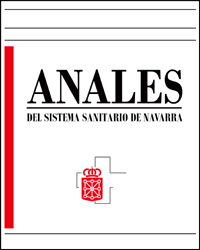Síndrome de apnea hipopnea del sueño e ictus
Palabras clave:
Ictus. Síndrome de Apnea Hipopnea. Factor de Riesgo Vascular.Resumen
Desde hace años se ha llamado la atención sobre la frecuente asociación entre el Síndrome de apnea hipopnea del Sueño (SAHS) y el ictus. Disponemos de múltiples y muy diversos estudios epidemiológicos que señalan una posible relación causal. De forma paralela, a lo largo de estos años se ha incrementado el conocimiento de distintos mecanismos fisiopatológicos intermedios por los que teóricamente la apnea podría favorecer la aparición de isquemia cerebral. Entre estos destacaban un incremento de la presión arterial, la aparición de arritmias, cambios hemodinámicos de la circulación cerebral y un estado protrombótico. Asimismo, también se ha comprobado cómo el tratamiento con CPAP era beneficioso para normalizar algunas de estas alteraciones. Sin embargo, no ha sido hasta muy recientemente cuando, gracias a la aparición de diversos estudios prospectivos, se ha demostrado de forma fehaciente que el SAHS es un factor de riesgo que incrementa la posibilidad de padecer un ictus isquémico, de forma independiente a la presencia de otros factores de riesgo clásicos. En espera de nuevos estudios de intervención que confirmen si el tratamiento con CPAP reduce este riesgo, es importante incluir en la anamnesis de pacientes que hayan sufrido un ictus o un accidente isquémico transitorio la búsqueda de datos que nos hagan pensar en un SAHS y remitir a estos pacientes a valoración por el Servicio de Neumología en caso necesario.Descargas
Descargas
Publicado
Cómo citar
Número
Sección
Licencia
La revista Anales del Sistema Sanitario de Navarra es publicada por el Departamento de Salud del Gobierno de Navarra (España), quien conserva los derechos patrimoniales (copyright ) sobre el artículo publicado y favorece y permite la difusión del mismo bajo licencia Creative Commons Reconocimiento-CompartirIgual 4.0 Internacional (CC BY-SA 4.0). Esta licencia permite copiar, usar, difundir, transmitir y exponer públicamente el artículo, siempre que siempre que se cite la autoría y la publicación inicial en Anales del Sistema Sanitario de Navarra, y se distinga la existencia de esta licencia de uso.








